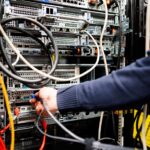What is IT equipment recycling?
With the growing worldwide concern with greenhouse gas emissions, the process of recycling keeps becoming more and more important as a way to improve sustainability. But what exactly is IT equipment recycling?
IT equipment recycling is the process of taking unused equipment and using its parts to repair or upgrade other pieces of hardware, thus extending their life and preventing these electronic devices from being simply thrown away. It’s a sequential process of dismantling computer hardware, separating out the pieces containing hazardous substances and then recovering valuable materials. Plastic, glass and metals can all be reused on other machines. This prevents equipment from ending up in landfills.
Why recycle IT equipment?
There are several reasons to recycle IT equipment, ranging from environmental concern to complying with the law. Recycling IT equipment not only reduces the amount of e-waste (electronic waste) that ends up in a landfill, but also cuts down the number of raw materials that are needed when the alternative is to manufacture new equipment. This is especially important because 80% of a piece of equipment’s lifetime emission come from it being manufactured.
Hardware often contains precious metals and other materials that can be reused in other machines, such as copper and aluminum. Another benefit of recycling IT equipment is that the refurbished parts and machines that result from the process help companies save money due to it being a cost-effective alternative to buying new.
Additionally, for many businesses, Corporate Social Responsibility or CSR is an integral part of their mission and their image, which means that sustainable practices and environmental consciousness are a top priority for them and something that is expected to keep growing in importance.
In summary, then, recycling IT hardware is a win-win both for companies and the environment. And as pressure grows from both society, and stakeholders for companies to become more and more sustainable, recycling is also a smart strategic move for any business with an IT component.
What IT equipment can be recycled?
The truth is that almost every electrical and electronic device can be broken down into its constituent components for recycling. This means that computer equipment recycling encompasses virtually every piece of electronics or IT hardware a company may use: circuit boards, storage media such as hard drives, networking equipment, all of it can be recycled, as all of it contains materials that can be reused.
The benefits of recycling computer parts are increased sustainability scores for the company and, when partnering with a company that provides third-party management, optimizing the return on investment of the purchase, since the equipment can provide spare parts to extend the life of other hardware in a different data center.
How IT equipment recycling works?
If a company decides to recycle its IT hardware, sorting out the different materials that make up hardware is an elaborate process. The IT equipment recycling process involves a specialist company taking the discarded equipment to a reprocessing plant, where it will be shredded into small pieces. After shredding, conveyor belts transfer the shredded pieces under powerful magnets which separates iron and steel from the e-waste: the magnets remove ferrous metals and non-metallic metals are collected with electronic currents. Plastic is sorted into different categories thanks to methods like using infrared light or density separation. When you recycle electronics, you are ensuring that all of these materials will be salvaged for future use.
What laws deal with IT equipment recycling?
As with other areas of pollution, e-waste is being taken more and more seriously by governments. Recycling electronics is regulated by law in different parts of the world. In the European Community, the Waste Electrical and Electronic Equipment Directive, known as the WEEE directive for short, sets collection, recycling and recovery targets for all types of electrical goods. The WEEE Directive also requires manufacturers of electric and electronic equipment to take care of organizing and financing the correct treatment of end of life equipment discarded by users.
With this legal framework in place, in most EU Member States Compliance and Take Back schemes (CTBS) have been founded to provide compliance services to manufacturers.
Complying with the relevant legislation of each country, then, is a crucial aspect of recycling IT equipment.
Disposal of sensitive data
When it comes to unused electronics, the decommissioning and recycling process also involves the secure destruction of data to ensure that no sensitive information can be obtained by others. No company wants to see valuable and sensitive information ending up in the hands of competitors or other actors, so taking measures to avoid this possibility is paramount.
This often involves the physical destruction of the equipment. Data destruction and equipment disposal that includes making sure the equipment is physically destroyed is a service that companies involved in recycling usually provide. This service also takes care of the matter of hazardous materials that may be contained in the equipment.
Partner with a professional IT equipment recycling service
Given the complexity of the recycling process of IT assets, it’s advisable for companies to partner with an IT equipment recycling service to guarantee compliance and benefit from their specialized experience. A company like Evernex that offers recycling services can take care of every step of the process, ensuring responsible recycling, quality and good results.
We provide an end-to-end recycling service certified by the EU’s WEEE directive to generate value by giving repurposed components a second life as refurbished hardware.
To learn more about how Evernex can help you maximize IT spend, optimize sustainability performance and protect the environment with Evernex hardware recycling, contact us!




